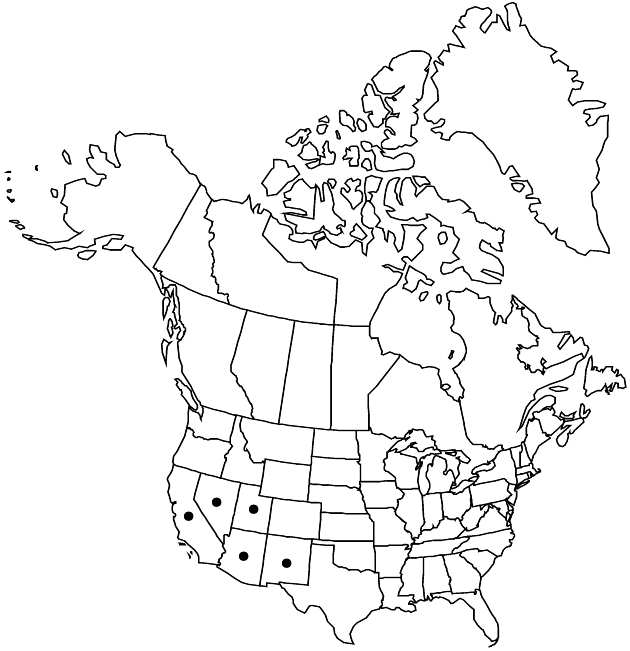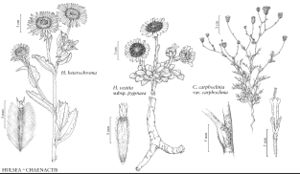Difference between revisions of "Chaenactis carphoclinia var. carphoclinia"
Synonyms: Chaenactis carphoclinia var. attenuata unknown
FNA>Volume Importer |
FNA>Volume Importer |
||
| Line 22: | Line 22: | ||
|elevation=-90–1900 m | |elevation=-90–1900 m | ||
|distribution=Ariz.;Calif.;Nev.;N.Mex.;Utah;Mexico (Baja California;Sonora). | |distribution=Ariz.;Calif.;Nev.;N.Mex.;Utah;Mexico (Baja California;Sonora). | ||
| − | |discussion=<p>Variety carphoclinia is one of the most abundant spring wildflowers in the Sonoran Desert; it extends to the southern Great Basin and northwestern Chihuahuan Desert. It is reported to be eaten by desert tortoises (Gopherus agassizii Cooper). Some stunted forms have been named <i></i>var.<i> attenuata</i>; such forms recur in the most arid (or otherwise severe) habitats throughout the range of the species.</p> | + | |discussion=<p>Variety carphoclinia is one of the most abundant spring wildflowers in the Sonoran Desert; it extends to the southern Great Basin and northwestern Chihuahuan Desert. It is reported to be eaten by desert tortoises (Gopherus agassizii Cooper). Some stunted forms have been named <i></i></i>var.<i><i> attenuata</i>; such forms recur in the most arid (or otherwise severe) habitats throughout the range of the species.</p> |
|tables= | |tables= | ||
|references= | |references= | ||
| Line 46: | Line 46: | ||
|publication year= | |publication year= | ||
|special status= | |special status= | ||
| − | |source xml=https://jpend@bitbucket.org/aafc-mbb/fna-data-curation.git/src/ | + | |source xml=https://jpend@bitbucket.org/aafc-mbb/fna-data-curation.git/src/f6b125a955440c0872999024f038d74684f65921/coarse_grained_fna_xml/V19-20-21/V21_1013.xml |
|tribe=Asteraceae tribe Heliantheae | |tribe=Asteraceae tribe Heliantheae | ||
|subtribe=Asteraceae (tribe Heliantheae) subtribe Chaenactidinae | |subtribe=Asteraceae (tribe Heliantheae) subtribe Chaenactidinae | ||
Revision as of 18:45, 24 September 2019
Plants (5–)10–30(–40) cm. Leaves basal (± withering) and cauline, longest 1–6(–7) cm; petioles scarcely dilated proximally, ± herbaceous. 2n = 16.
Phenology: Flowering Jan–Jun.
Habitat: Open, rocky or gravelly (sometimes sandy) desert slopes and flats, shrublands
Elevation: -90–1900 m
Distribution

Ariz., Calif., Nev., N.Mex., Utah, Mexico (Baja California, Sonora).
Discussion
Variety carphoclinia is one of the most abundant spring wildflowers in the Sonoran Desert; it extends to the southern Great Basin and northwestern Chihuahuan Desert. It is reported to be eaten by desert tortoises (Gopherus agassizii Cooper). Some stunted forms have been named var. attenuata; such forms recur in the most arid (or otherwise severe) habitats throughout the range of the species.
Selected References
None.
Lower Taxa
None.
